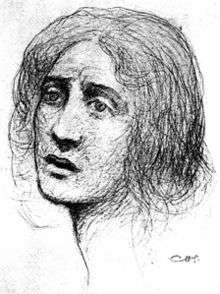Al-Khansa
Tumāḍir bint ʿAmr ibn al-Ḥārith ibn al-Sharīd al-Sulamīyah (Arabic: تماضر بنت عمرو بن الحارث بن الشريد السُلمية), usually simply referred to as al-Khansāʾ (Arabic: الخنساء, meaning "snub-nosed", an Arabic epithet for a gazelle) was a 7th-century Arabic poet, said to have died in 646 CE.[1]
Al-Khansa | |
|---|---|
الخنساء | |
 Al-Khansa's name in Arabic calligraphy | |
| Born | c. 575 Najd, Arabia |
| Died | c. 646 (aged 70–71) Najd, Arabia |
| Occupation | Poetess |
In her time, the role of a female poet was to write elegies for the dead and perform them for the tribe in public oral competitions. Al-Khansāʾ won respect and fame in these competitions with her elegies, and is widely considered as the finest author of Arabic elegies and one of the greatest and best known female Arab poets.[2][3]
Life

Al-Khansāʾ was born and raised in Najd, Arabia, into a wealthy family, being the daughter of the head of the al-Sharid clan.[3] She was a contemporary of Muhammad, and eventually converted to Islam.[3]
In 612, her brother Muʿawiyah was killed by members of another tribe. Al-Khansāʾ insisted that her brother, Ṣakhr, avenge Muʿawiyah's death, which he did. Ṣakhr was wounded in the process and died of his wounds a year later. Al-Khansāʾ mourned her two brothers' deaths in poetry, writing over a hundred elegies about the two of them alone,[3] and began to gain fame for her elegiac compositions especially due to her powerful recitals.[3] The contemporary Arab poet al-Nābighah al-Dhubyānī said to her: "You are the finest poet of the jinn and the humans." (Arabic: إنك أشعر الجن والإنس).[4] Similarly, another anecdote says that al-Nabigha told al-Khansāʾ, "If Abu Basir[5] had not already recited to me, I would have said that you are the greatest poet of the Arabs. Go, for you are the greatest poet among those with breasts".[6] She responded by saying, "I'm the greatest poet among those with testicles, too".[7]
She was married at least twice, and had six children, all of whom were also poets and eventually converted to Islam.[3] Four of them, Yazīd, Muʿāwiyah, ʿAmr, and ʿAmrah, were killed in the Battle of Qadisiyah. When she received the news, she allegedly said, "Praise be to God who honored me with their martyrdom. And I have hope from my Lord that he will reunite me with them in the abode of his mercy." (Arabic: الحمد لله الذي شرفني بقتلهم، وأرجو من ربي أن يجمعني بهم في مستقر رحمته).[8]
See also
- List of famous Arabs
- Women in Arab societies
- Women in Muslim societies
References
- Abdullah al-Udhari (1999). Classical Poems by Arab Women. London: Saqi. p. 58.
- Classical Arabic Literature: A Library of Arabic Literature Anthology. Translated by Geert Jan van Gelder. New York: New York University Press. 2013.
- Ghada Hashem Talhami (2013). Historical Dictionary of Women in the Middle East and North Africa. Scarecrow Press. p. 202.
- Ibn Qutaybah (1987). al-Shiʿr wa-al-shuʿarāʾ (in Arabic). Beirut: Dār ʾAḥyāʾ al-ʿUlūm. p. 218.
- "Asha". The Great Soviet Encyclopedia. 1979.
- Butrus al-Bustānī (1968). Udabā' al-Arab fi al-Jāhiliya wa sadr al-Islām (in Arabic). ktab INC. p. 209.
- Hasna Reda Makdashi (2008). Arab Women Writers A Critical Reference Guide, 1873-1999. American University in Cairo Press.
- Al-Dughmi, Muhammad Rakan (1985). Al-Tajassus wa ʾaḥkāmuhu fī al-sharīʿah al-ʾislāmīyah (in Arabic). Beirut: Dār al-salām. p. 193.